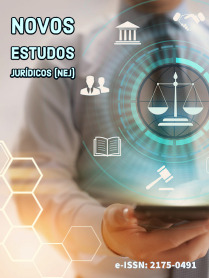THE MODERN SOCIAL CONTRACT DURING AND AFTER THE PANDEMIC: CONSTITUTIONALISM AND THE STATE OF PERMANENT EXCEPTION
DOI:
https://doi.org/10.14210/nej.v27n3.p552-574Keywords:
Social Contract, Pandemic, Constitutionalism, Permanent State of ExceptionAbstract
Contextualization: The Modern Social Contract during and after the Covid-19 Pandemic is still the political and legal framework for understanding the historical-civilizational importance of the constitutional phenomenon, that is, of Constitutionalism and the linearity of its transformations, which are characterized in the present study, through the transition from the democratic State-Constitutionalism to the State-Constitutionalism of the exception, especially between the period related to the years 2020 and the beginning of the year 2022.
Objectives: Discuss, based on Paolo Prodi's thinking, about the Modern Social Oath-Contract during and after the Pandemic; to analyze the conception of Constitutionalism as a historical phenomenon of power limitation; to carry out an approach to the permanent State of Exception, terminology used by philosopher Carl Schmitt, adopting as an observation parameter, which will take into account the trajectory of Democratic Constitutionalism to the Constitutionalism of Exception, the political and legal framework intended to face the effects of the Pandemic caused by the pandemic SARS-CoV-2 virus.
Methodology: A phenomenological-hermeneutic approach methodology, historical and monographic procedure methods will be used, together with the technique of indirect documentation research.
Result: A first conclusion, which comes from this work, carried out in the form of questioning, is the following: what remains of the Modern Social Contract in the face of the Decrees edited during the Pandemic?
Downloads
References
AGAMBEN, Giorgio. Pilatos e Jesus. São Paulo: Boitempo; Florianópolis: UFSC, 2014.
AGAMBEN, Giorgio. Em que ponto estamos: a epidemia como política. São Paulo: n-1 edições, 2021.
BARBERA, Augusto. Le basi filosofiche del costituzionalismo. Roma: Laterza, 2020.
BECK, Ulrich. A metamorfose do mundo: novos conceitos para uma nova realidade. Rio de Janeiro: Zahar, 2018.
BÖCKENFÖRDE, Ernest-Wolfgang. História da filosofia do direito e do estado: antiguidade e idade média. Porto Alegre: Sergio Antonio Fabris Ed., 2012.
FERRAJOLI, Luigi. Costituzionalismo oltre lo Stato. Modena: Mucchi, 2017.
FIORAVANTI, Maurizio. Constitucionalismo: experiencias históricas y tendencias actuales. Madrid: Editorial Trotta, 2014.
HOBBES, Thomas. Leviatã, ou, a matéria, forma e poder de um estado eclesiástico e civil. São Paulo: Ícone, 2014.
JELLINEK, Georg. Teoría general del Estado. México: FCE, 2000.
KOSELLECK, Reinhart. Crítica e crise: uma contribuição à patogênese do mundo burguês. Rio de Janeiro: Contraponto, 1999.
LOCKE, John. Dois tratados do governo civil. Lisboa: Edições 70, 2015.
MATTEUCCI, Nicola. Lo Stato Moderno. Bologna: Società Editrice il Mulino, 1997.
PRODI, Paolo. Il sacramento del potere: il giuramento politico nella storia costituzionale dell’Occidente. Bologna: Società Editrice il Mulino, 1992.
ROUSSEAU, Jean-Jacques. O contrato social. Porto Alegre: L&PM, 2019.
SASSEN, Saskia. Territorio, autoridad y derechos: de los ensamblajes medievales a los ensamblajes globales. Buenos Aires: Katz, 2012.
SCHMITT, Carl. Teología política. Madrid: Trotta, 2009.
SKINNER, Quentin. As fundações do pensamento político moderno. São Paulo: Companhia das letras, 1996.
ZOLO, Danilo. Globalização: um mapa dos problemas. Florianópolis: Conceito Editorial, 2010.
Downloads
Published
How to Cite
Issue
Section
License
Na qualidade de autor(es) da colaboração, original e inédita, sobre o qual me(nos) responsabilizo(amos) civil e penalmente pelo seu conteúdo, após ter lido as diretrizes para autores, concordado(amos) plenamente com as Políticas Editorias da Revista Novos Estudos Jurídicos - NEJ e autorizo(amos) a publicação na rede mundial de computadores (Internet), permitindo, também, que sua linguagem possa ser reformulada, caso seja necessário, sem que me(nos) seja devido qualquer pagamento a título de direitos autorais, podendo qualquer interessado acessá-lo e/ou reproduzi-lo mediante download, desde que a reprodução e/ou publicação obedeçam as normas da ABNT e tenham a finalidade exclusiva de uso por quem a consulta a título de divulgação da produção acadêmico científico.





























